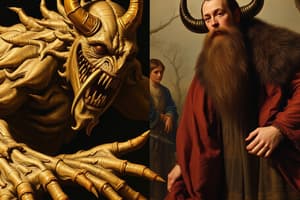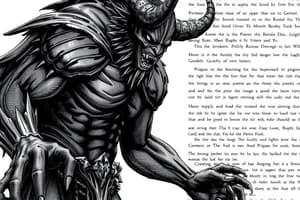Podcast
Questions and Answers
Explain the contrast that is developed between Herot, home of the Danes, and Grendel's home. How do the biblical allusions extend this contrast?
Explain the contrast that is developed between Herot, home of the Danes, and Grendel's home. How do the biblical allusions extend this contrast?
Herot's home was happy, fun, and bright with laughing. Grendel's home was haunted with moors and the wild marshes. He made his home in a hell not hell but earth covered with slime. The biblical allusions extended this contrast by Grendel being born of Cain and banished by God, while Herot represents the ancient beginnings of us all and all things good.
What do the hall and Grendel represent based on their descriptions in the first paragraph?
What do the hall and Grendel represent based on their descriptions in the first paragraph?
The hall represents heaven and all things fun and good, while Grendel represents hell and misery.
What conflict is foreshadowed through the contrast between Herot and Grendel's home?
What conflict is foreshadowed through the contrast between Herot and Grendel's home?
Grendel is being stirred and was punished forever for the crime of Abel's death, foreshadowing his revenge on everyone who wronged him.
Identify the alliteration in lines 33-37. What might be the purpose of this device?
Identify the alliteration in lines 33-37. What might be the purpose of this device?
What is the tone of lines 44-49? What details help convey the poet's attitude?
What is the tone of lines 44-49? What details help convey the poet's attitude?
What happens to Hrothgar's hall, and why does the poet say 'hate had triumphed'?
What happens to Hrothgar's hall, and why does the poet say 'hate had triumphed'?
Identify the details that show the threat Grendel poses.
Identify the details that show the threat Grendel poses.
What does Grendel's unwillingness to accept gold or land to settle the feud mean for the Danes?
What does Grendel's unwillingness to accept gold or land to settle the feud mean for the Danes?
Find the kenning in lines 74-78 and explain how it contributes to the characterization of Grendel.
Find the kenning in lines 74-78 and explain how it contributes to the characterization of Grendel.
In lines 241-259, what details reinforce the idea of Grendel as a force of evil?
In lines 241-259, what details reinforce the idea of Grendel as a force of evil?
Identify foreshadowing in this passage and explain why the poet includes it.
Identify foreshadowing in this passage and explain why the poet includes it.
Why does Beowulf allow one of his followers to be taken by Grendel before he attacks him?
Why does Beowulf allow one of his followers to be taken by Grendel before he attacks him?
Why is Grendel such a formidable opponent?
Why is Grendel such a formidable opponent?
What is the significance of Beowulf's men being unable to help him?
What is the significance of Beowulf's men being unable to help him?
Identify the evidence supporting the idea that the fight between Grendel and Beowulf is symbolic of the struggle between good and evil.
Identify the evidence supporting the idea that the fight between Grendel and Beowulf is symbolic of the struggle between good and evil.
How does the symbolism of Beowulf's gesture in lines 356-359 reveal a theme resulting from this conflict? What is the theme?
How does the symbolism of Beowulf's gesture in lines 356-359 reveal a theme resulting from this conflict? What is the theme?
How do lines 376-380 relate to the Anglo-Saxon view of immortality?
How do lines 376-380 relate to the Anglo-Saxon view of immortality?
What are the details and techniques the poet uses to convey the brutality of Grendel's mother's attack?
What are the details and techniques the poet uses to convey the brutality of Grendel's mother's attack?
What is the significance of Grendel's mother's actions and what do they foreshadow?
What is the significance of Grendel's mother's actions and what do they foreshadow?
Identify the descriptive images linking Grendel's mother's home to concepts of death and darkness.
Identify the descriptive images linking Grendel's mother's home to concepts of death and darkness.
How does Grendel's mother inadvertently give Beowulf an advantage?
How does Grendel's mother inadvertently give Beowulf an advantage?
How does this battle differ from Beowulf's encounter with Grendel?
How does this battle differ from Beowulf's encounter with Grendel?
What is the similarity between the two battles?
What is the similarity between the two battles?
What is the significance of Beowulf's ability to wield the sword?
What is the significance of Beowulf's ability to wield the sword?
Identify the images of light in lines 526 and connect them with Beowulf's victory.
Identify the images of light in lines 526 and connect them with Beowulf's victory.
What does Beowulf cutting off Grendel's head symbolize?
What does Beowulf cutting off Grendel's head symbolize?
What is revealed about the Anglo-Saxon values in lines 546-568?
What is revealed about the Anglo-Saxon values in lines 546-568?
What is the transformation of the lake, and what has Beowulf metaphorically restored?
What is the transformation of the lake, and what has Beowulf metaphorically restored?
Identify the details in the final lines of the poem that reinforce the idea that Beowulf is superior to all others.
Identify the details in the final lines of the poem that reinforce the idea that Beowulf is superior to all others.
Flashcards
Herot's Symbolism
Herot's Symbolism
Herot represents happiness, light, and joy, contrasting with Grendel's dark dwelling.
Grendel's Origin
Grendel's Origin
Grendel's lineage connects him to Cain, highlighting his evil nature and banishment.
Hall vs. Grendel (Symbolism)
Hall vs. Grendel (Symbolism)
The hall represents heaven/goodness, contrasting with Grendel's representation of Hell/misery.
Foreshadowing (Grendel)
Foreshadowing (Grendel)
Signup and view all the flashcards
Alliteration's Effect (Lines 33-37)
Alliteration's Effect (Lines 33-37)
Signup and view all the flashcards
Hrothgar's Despair (Tone)
Hrothgar's Despair (Tone)
Signup and view all the flashcards
Grendel's Night Attack
Grendel's Night Attack
Signup and view all the flashcards
Grendel's Unrelenting Wrath
Grendel's Unrelenting Wrath
Signup and view all the flashcards
Grendel as a Predator
Grendel as a Predator
Signup and view all the flashcards
Grendel's Nighttime Ambushes
Grendel's Nighttime Ambushes
Signup and view all the flashcards
Grendel's Foreshadowed Violence
Grendel's Foreshadowed Violence
Signup and view all the flashcards
Beowulf's Tactical Sacrifice
Beowulf's Tactical Sacrifice
Signup and view all the flashcards
Grendel's Strength
Grendel's Strength
Signup and view all the flashcards
Beowulf's Men's Inability
Beowulf's Men's Inability
Signup and view all the flashcards
Good vs. Evil Theme
Good vs. Evil Theme
Signup and view all the flashcards
Beowulf's Victory Symbolism
Beowulf's Victory Symbolism
Signup and view all the flashcards
Anglo-Saxon Immortality
Anglo-Saxon Immortality
Signup and view all the flashcards
Grendel's Mother's Motive
Grendel's Mother's Motive
Signup and view all the flashcards
Grendel's Mother's Lair
Grendel's Mother's Lair
Signup and view all the flashcards
Beowulf's Advantage (Mother)
Beowulf's Advantage (Mother)
Signup and view all the flashcards
Contrast in Battles
Contrast in Battles
Signup and view all the flashcards
Beowulf's Ineffective Weapon
Beowulf's Ineffective Weapon
Signup and view all the flashcards
Beowulf's Divine Support
Beowulf's Divine Support
Signup and view all the flashcards
Victory and Divine Approval
Victory and Divine Approval
Signup and view all the flashcards
Beowulf's Trophy
Beowulf's Trophy
Signup and view all the flashcards
Anglo-Saxon Values
Anglo-Saxon Values
Signup and view all the flashcards
Lake's Symbolic Transformation
Lake's Symbolic Transformation
Signup and view all the flashcards
Beowulf's Superiority (Grendel's Skull)
Beowulf's Superiority (Grendel's Skull)
Signup and view all the flashcards
Study Notes
Herot vs. Grendel's Home
- Herot symbolizes happiness, laughter, and light, contrasting with Grendel's dark, marshy, and hellish dwelling.
- Grendel's lineage traces back to Cain, emphasizing his banishment and evil nature compared to Herot's positive connotations.
Representation of the Hall and Grendel
- The hall is seen as a representation of heaven, joy, and goodness, while Grendel represents hell and misery.
Foreshadowed Conflict
- Grendel's eternal punishment and deep-seated rage foreshadow his desire for revenge against mankind, influenced by his feelings of isolation.
Use of Alliteration
- Alliteration in lines 33-37 enhances the depiction of the peaceful sleeping warriors before Grendel’s violent intrusion, emphasizing the disturbance he creates.
Poet's Tone
- A tone of sadness is conveyed in lines 44-49, highlighting Hrothgar’s despair and fear as he mourns the losses inflicted by Grendel.
Hrothgar's Hall Attack
- Grendel attacks while the warriors are in a drunken slumber, killing 30 men and symbolizing his triumph over hate and evil.
Grendel's Threat to Hrothgar
- Grendel's dominance and ability to decimate Hrothgar's warriors led to years of suffering and emptiness within the hall.
Grendel's Motivations
- Grendel's refusal of gold or land illustrates his insatiable nature and the Danes' hopelessness against his unrelenting wrath.
Kennings and Characterization
- The kenning "shadow of death" in lines 74-78 portrays Grendel as a sneaky predator, reinforcing his menacing character.
Grendel as a Force of Evil
- Lines in the 240s depict Grendel’s intentions, emphasizing his innate evil by showcasing his predatory nature during night ambushes.
Foreshadowing of Grendel’s Actions
- Grendel’s turmoil and desire to inflict pain highlight the poet's foreshadowing of future violence, suggesting impending doom for the Danes.
Beowulf’s Tactical Choice
- Beowulf allows a follower to be sacrificed to deceive Grendel into confidence, positioning himself for a strategic advantage in battle.
Grendel's Fearsome Strength
- Grendel's brutal attack, as described in lines 262-268, showcases his violence and terrifying size, establishing him as a formidable foe.
Impact of Beowulf's Men
- The inability of Beowulf's men to assist him during battle underscores the intensity of the fight, demonstrating that the hall itself shakes from the struggle.
Symbolism of Good vs. Evil
- The conflict between Beowulf and Grendel embodies the bigger theme of good versus evil, with Grendel recognizing Beowulf's formidable strength.
Beowulf's Symbolic Gesture
- Beowulf's victorious gesture after defeating Grendel symbolizes the triumph of good, reflecting the theme that evil ultimately does not prevail.
Reflection of Anglo-Saxon Immortality
- Lines 376-380 depict Beowulf’s accomplishments as a testament to his strength, mirroring the Anglo-Saxon belief in heroic deeds leading to immortality.
Grendel's Mother's Revenge
- Grendel's mother seeks vengeance for her son’s death, foreshadowing an impending conflict between her and Beowulf.
Grendel's Mother's Lair
- Descriptions of Grendel's mother's home invoke imagery of death and darkness, reinforcing the sinister environment she represents.
Beowulf's Advantage in Battle
- Grendel's mother unintentionally provides Beowulf with an advantage by drawing him into an environment where he is safeguarded from her attacks.
Contrast in Battles
- Unlike his encounter with Grendel, Beowulf’s fight with Grendel's mother involved a weapon that initially proved ineffective, showcasing the battle's distinct nature.
Similarity of Battles
- Both battles exemplify the recurring theme of good versus evil and demonstrate intense violence.
Significance of Beowulf's Sword
- Beowulf’s ability to use the sword represents divine support, showcasing his strength and the favor of the gods in his victory.
Light Imagery in Victory
- Light imagery in lines 526 connects Beowulf's victory to divine approval, symbolizing restoration and the defeat of evil throughout the land.
Beowulf’s Trophy
- Cutting off Grendel's head serves as proof of his victory, symbolizing heroism and solidifying his status as a true hero.
Anglo-Saxon Values
- The poem reveals Anglo-Saxon values of loyalty, bravery, and the significance of honor in maintaining societal order.
Transformation of the Lake
- The lake's transformation from disease to calmness metaphorically illustrates Beowulf's purging of evil from the kingdom, restoring peace.
Beowulf's Superiority
- The struggle to carry Grendel's skull highlights Beowulf's strength and superiority, reinforcing his heroic status among the warriors.
Studying That Suits You
Use AI to generate personalized quizzes and flashcards to suit your learning preferences.
Description
Explore the significant contrast between Herot, the joyful home of the Danes, and the dark, foreboding lair of Grendel. This study guide delves into the biblical allusions that further highlight the differences between these two settings in the epic tale of Beowulf.




